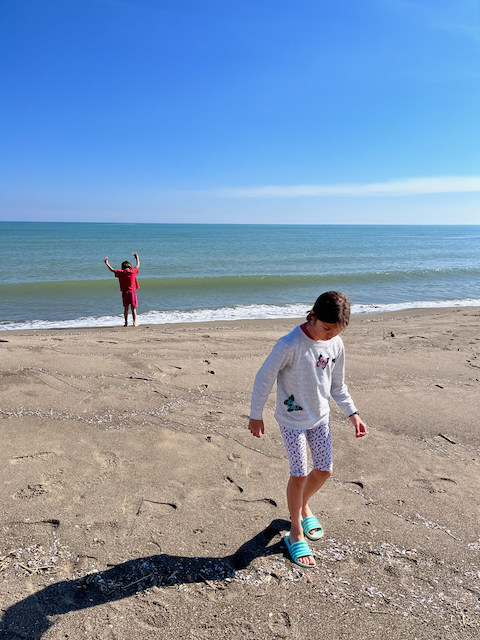Today in civics class, the teacher invited my older daughter to tell her story. Only if she wants to. Adoption is not a secret at home, in the neighborhood, in the church or at school. The natural way we treat this part of our story was passed on as such. It is neither good nor bad. It’s challenging at times, it’s sad, it’s a blessing, it’s a joy. It’s a mixture of many emotions, like life.
The invitation was accepted wholeheartedly. My daughter likes to tell stories, she likes to capture attention through coherent and rich speeches. As my father says, “she’s an artist”.
And so she stood in front of the class and told her story, from abandonment to new family, and all the details in between. That it was captivating is an understatement. Towards the end, like a gifted speaker, she once again captured their attention by announcing that he was going to share a secret with them, something she had never told them before. And so, my dear girl, she declared without her voice shaking that she is of Roma ethnicity. And sometimes she heard them make offensive comments about ethnicity. She added: “look at me. Am I aggressive? Am I ugly? I am not. And yet I am of Roma ethnicity.”
She had extraordinary audacity. I don’t know if I’ve ever been so proud of her. Her voice, the clarity with which she expresses herself and names emotions, situations, expectations, limits… she’s a 9-year-old wonder.
Her decision to assume a status, to speak bravely, to civically educate her third-grade classmates… she gave me a gift. All our conversations that sometimes seemed dry or useless are bearing fruit. If I hadn’t told her (late) three years ago, three years after the adoption, when he was 6 years old, she wouldn’t be talking today. Although it was a shocking and painful conversation with follow-up questions, she was still innocent enough and young in mind and heart to integrate the information easily…
But in the end and after all, why was it a difficult conversation at 6 years of age? Harder than the one about adoption started and often approached started when she was 3 years old.
First of all, I didn’t think it was a big deal and I mentioned ethnicity a few times at the beginning, as an insignificant fact for us. She didn’t even understand what it meant at the age of 3. But in fact she didn’t understand the adoption either, but the circumstances of the move from foster care, the visits of the social workers, the name change, all forced us and gave us the context to keep clarifying our situation.
Half a year after the approval of the adoption, I did not bring up the issue of adoption. We all forgot. It becomes a secondary fact and life happens. And that’s good too. We realize how much love binds us together and how we became a family does not fundamentally define us. But just because we and she forgot, when it came to adoption, we adults accessed the memory easily. But our daughter panicked. “What adoption?” I told her (again) that she was adopted, and she seemed worried. “But what does it mean?” I referenced the recent memories and it cleared up and calmed down. Since then I have made a conscious effort to bring up the past, the miracle of adoption, the joy of finding her, the privilege of being her parents. And besides, we decided to adopt again. Observing the process and the steps, some she remembered, others she went through for the first time as a child receiver. Like the host.
I’ve told the story before, but these days I’ve been thinking about similarities and differences.
Speaking naturally about adoption, our daughter told the children at Kindergarten. With passion and grace. When I picked her up after the program, she said to me slightly offended: “Mom, the children from the kindergartens are bragging that they too are adopted”. I knew then that I was on the right track. My fear for her possible suffering from exclusion on the grounds that she is adopted has dissipated. At 5 years old, she had the vocabulary and the courage to communicate about adoption and present it in a warm light, just as it is. Nothing to be afraid of.
In this context, I have been thinking these days, how it would have been to tell them that she is of Roma ethnicity, with passion and creativity, so that at the same age the children would say that they are too. And my daughter would be a little upset that the people at the school are bragging that they too are of Roma ethnicity.
I find myself a little in my daughter. We grew up learning about God and singing christian songs. Although we were Orthodox (like the majority of Romanians in the 80s), our passion for Scripture labeled us as “pocăiți” (repenting believer). And, being a child, my little neighbors asked me mischievously: “are you “pocaita”?” To which I answered boldly: “yes”. After an uncomfortable moment of silence I asked, “but do you even know what pocait means?” I gave them a linguistic speech about the meaning and origin of words. I had heard in a camp about poca-ianis, and the Greek meaning, and meta-noia. (repent and renew your mind). After all, the point is that it would have been just as hilarious to hear the neighbors then brag about being repentant (pocait)
At the age of 6, Jackie heard some friends from church talking about the Roma. With fear, with disgust, with pity. Back then we hadn’t had the leisurely conversation about ethnicity. In fact, that conversation heard second hand motivated me to approach the subject.
I told her that her adoption papers state that she is Roma. The little sister was 3 and a half years old and newly adopted. After the initial shock and processing the information, she also told her sister without hesitation. Who started to cry and said that she doesn’t want to talk about ethnicity now. But she processed the information. Some time later hearing an extraordinary woman talking about the perspective of society and the burden of the Roma ethnicity, which later became a launching pad and a power engine after embracing her origins, the youngest daughter came to ask me: “why is the lady talking about the Roma ethnicity?” “Because she is also of Roma ethnicity” I answer in a whisper. At the end of the speech, we went out for lemonade. My youngest daughter, without telling me, went to my Roma friend, told her in the sweetest voice “I’m Roma too” and gave her a tight and long hug. It was emotional for me and my friend. I knew then that we had made the right choice to speak to them openly. Positive examples and truth form a healthy foundation of identity.
Writing these thoughts, I remembered the story of a mother who adopted a Roma girl 14 years ago. In the meantime, he also lived in America for 5 years. Her attitude is equally fascinating and brave, bold and clear. She talks about her ethnicity and answers the questions that come up. It was suggested to her not to tell everyone, because not everyone understands. But perhaps even for the most narrow-minded, her boldness, her beauty, her eloquence can make a difference.

